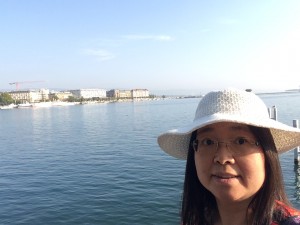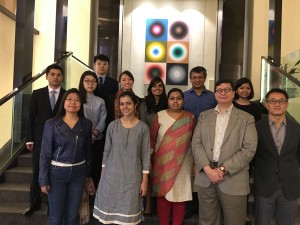
On 1 October 2016, the contract between the Internet Corporation for Assigned Names and Numbers (ICANN) and the United States Department of Commerce National Telecommunications and Information Administration (NTIA), to perform the Internet Assigned Numbers Authority (IANA) functions, has officially expired. This historic moment marks the transition of the coordination and management of the Internet’s unique identifiers to the private-sector, a process that has been committed to and underway since 1998.
Prof. Xue, as a long-time active member on the Multi-stakeholder Steering Group of Asia Pacific Regional IGF (APrIGF) called for US government to timely complete the IANA oversight transition as scheduled at APrIGF 2016 in Taipei. As a member of the Draft Committee, Prof. Xue suggested use the strong and unequivocal wording to support the global multi-stake process for the transition.
Before the IANA Functions contract ended on October 1st, 2016, some in the US Congress had challenged the validity of the proposal to transfer (or “transition”) the oversight role currently exercised by the US Administration, to a multi-stakeholder Internet community equipped with accountability mechanisms.
Prof. Xue, along with the other Internet leaders, signed on a letter sent to the President of the United States of America on September 14, 2016. Similar letters were sent to the Speaker and Leadership of the House of Representatives, as well as to the President pro tempore and Leadership of the Senate. In these letters, the signatories state: “It is our sincere hope that the Administration will now implement, and that the Congress of the United States of America will not impede the transition of oversight of the IANA Functions.”
Below is the full text of the letter.
List of recipients of our letters:
– President Barack Obama,
– Ms. Penny Pritzker, Secretary of Commerce
– Hon. Ryan Paul, Speaker of the House of Representatives
– Hon. Harry Reid, Democratic Leader
– Hon. Nancy Pelosi, Minority Leader
– Hon. Orrin Hatch, President pro tempore of the Senate
– Hon. Mitch McConnell, Majority Leader
Copies of these letters were sent to:
– Dr. Larry Strickling, Assistant Secretary of Commerce, Administrator of NTIA
– Ms. Fiona Alexander, NTIA
– Dr. Steve Crocker, Chair, and Members of the ICANN Board
– Members of the ICG
Copies of the letters were communicated by separate emails to the following media:
– TheHill.com
– RollCall.com
– BBC North America
– Washington Internet Daily
– Bloombert BNA
– The Guardian, London
* * *
12th of September, 2016
To:
The President of the United States of America
(…)
Dear Mr. President:
As the first truly universal infrastructure in human history, the Internet has allowed huge progress to be achieved in business, legislation, science, public health, agriculture, industry, education and communications, at the same time as it has facilitated the daily lives of ordinary citizens all over the world.
Because of the seminal contribution of the United States of America in creating the Internet and carrying forward so many of its subsequent developments, your country has earned the deep and lasting gratitude of billions of people. In fact, today’s younger generations in so many countries cannot even imagine life without the benefits of ubiquitous connectivity, quick and free access to knowledge, as well as the facilitation of social intercourse.
As individuals deeply engaged in, and committed to improving the integrity, stability and uses of the Internet, we believe that now is an appropriate time to confirm the multi-stakeholder model of the Internet, in a way that would benefit both the United States and the rest of the world. In this respect, we note that the United States have consistently considered that the further development of the Internet would best be served by a global multi-stakeholder model:
1. At the inception of the Internet Corporation for Assigned Names and Numbers (ICANN) in September 1998, the U.S. Government and Internet stakeholders envisioned that the U.S. oversight of the Internet Assigned Numbers Authority functions (“IANA functions”) would be temporary. Also in 1998, the U.S. Department of Commerce issued a Statement of Policy that the U.S. Government “is committed to a transition that will allow the private sector to take leadership for DNS (Domain Name System) management.”
2. In December 2012, the House of Representatives and the Senate jointly stated: “It is the sense of Congress that the Secretary of State, in consultation with the Secretary of Commerce, should continue working to implement the position of the United States on Internet governance that clearly articulates the consistent and unequivocal policy of the United States to promote a global Internet free from government control and preserve and advance the successful multistakeholder model that governs the Internet today.” (H.Con.Res.127; S.Con.Res.50).
3. In March 2014, the National Telecommunication and Information Agency (NTIA) announced its intention to transition key Internet domain name functions to the global multistakeholder community. As the first step, NTIA asked ICANN to convene global stakeholders to develop a proposal to transition the current oversight role played by NTIA in the coordination of the Internet’s domain name system, and set out four criteria for such a transition to merit consideration. As requested, ICANN convened the IANA Stewardship Transition Coordination Group (ICG) which started work in December 2014.
4. In March 2016 the ICG, with the input of the Internet community, submitted its Proposal to NTIA. The NTIA certified that the Proposal met the four criteria (June 2016), approved it (August 2016), and announced its intention to let the IANA Functions contract expire on October 1st, 2016.
It is our belief and indeed our conviction that the transition of oversight of the IANA Functions, from an agency of the United States Government to a multi-stakeholder system equipped with detailed checks and balances, will safeguard the security, openness and efficiency of the Internet, while helping to meet some of the challenges facing humanity and the world in which we live.
In bringing this to your esteemed attention, we are inspired by the fact that the foundation of the United States of America was, in itself, a major innovation of its time: it set out a model of government predicated on principles, a judiciary unswerved by political partisanship, and an economic model in which wealth and success would be earned by initiative and enterprise rather than by inheritance alone. Implementing those lofty principles required open information, as well as the awareness and growing participation of citizens. For the Internet today, the challenges are not very different.
It is our sincere hope that the Administration will now implement, and that the Congress of the United States of America will not impede the transition of oversight of the IANA Functions.
We are addressing similar letters to the Honorable Speaker of the House of Representatives, and to the Honorable President pro tempore of the Senate.
Most respectfully,
On behalf of the signatories listed below:
Jean-Jacques Subrenat
(Ambassador, ret.)
SIGNATORIES:
The Hon. Carl Bildt (Sweden)
Chair, Global Commission on Internet Governance; former Prime Minister & Foreign Minister
Dr. Vinton G. Cerf (United States)
former Chair of the Board of ICANN, Internet Pioneer
Ms. Avri Doria (United States)
Principal Researcher, Technicalities
Mr. Roberto Gaetano (Italy)
Chair, the Public Interest Registry
Prof. Dr. MURAI Jun 村井 純 (Japan)
Dean & Professor, Environment and Information Studies, Keio University
Founder of Junet & WideProject
Dr. Nii Narku Quaynor (Ghana)
Chairman, Ghana Dot Com Ltd.; founding Chairman of AfriNIC
Ms. Njeri Rionge (Kenya)
Founder & CEO, Ignite Consult. & Investment; co-founder & Director, Wananchi Online Ltd.
The Hon. Ms. Marietje Schaake (Netherlands)
Founder, Intergroup on the Digital Agenda for Europe; Member of the European Parliament
Mr. Jean-Jacques Subrenat (France)
Ambassador (ret.); Former member, ICANN Board; Member of the ICG (2014~)
Dr. Prof. XUE Hong 薛虹 (China)
Founding Director, Institute for Internet Policy & Law, Beijing Normal Univ. 北京师范大学
Dr. Prof. YOKOZAWA Makoto 横澤 誠 (Japan)
Professor, Kyoto University; Vice Chair of the Internet Economy WG, Keidanren
(Views expressed in this letter are those of the signatories, and do not purport to represent the positions of entities with which they may be associated.)
 IIPL has been working diligently with its research partner Indian Center of Internet and Society (CIS) on the Issues in Mobile Internet and Access to Knowledge. The joint project has been going for two years. A couple of research exchanges, in-person meetings or virtual calls, have been arranged. Both parties have been working on four chapters on copyright, licensing, patent and anti-trust related issues on the Mobile Internet respectively in Chinese and Indian legal environment. A comprehensive review meeting was held at end of February 2017 in Macau, with the support of local research institutions. At the review meeting, both Chinese and Indian researchers of each chapter made the in-depth presentation on research methodology, progress and outlines of the contents. Prof. Xue presented, on behalf of the Chinese team, on all four chapters that have been working on from the Chinese side. 7 India young researchers presented respectively the chapters from the Indian side. International experts from Canada ICTSD and USA were invited to review the research and highly acknowledged the quality and value of the outputs.
IIPL has been working diligently with its research partner Indian Center of Internet and Society (CIS) on the Issues in Mobile Internet and Access to Knowledge. The joint project has been going for two years. A couple of research exchanges, in-person meetings or virtual calls, have been arranged. Both parties have been working on four chapters on copyright, licensing, patent and anti-trust related issues on the Mobile Internet respectively in Chinese and Indian legal environment. A comprehensive review meeting was held at end of February 2017 in Macau, with the support of local research institutions. At the review meeting, both Chinese and Indian researchers of each chapter made the in-depth presentation on research methodology, progress and outlines of the contents. Prof. Xue presented, on behalf of the Chinese team, on all four chapters that have been working on from the Chinese side. 7 India young researchers presented respectively the chapters from the Indian side. International experts from Canada ICTSD and USA were invited to review the research and highly acknowledged the quality and value of the outputs.
![IMG_1975[1]](http://wiki.iipl.org.cn/wp-content/uploads/2016/09/IMG_19751-300x225.jpg)
![IMG_1752[1]](http://wiki.iipl.org.cn/wp-content/uploads/2016/09/IMG_17521-300x225.jpg)
![IMG_1625[1]](http://wiki.iipl.org.cn/wp-content/uploads/2016/09/IMG_16251-300x225.jpg)